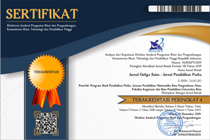Design of Cognitive Conflict-Based Interactive Multimedia Using Adobe Animate CC 2019 On Global Warming Materials
Abstract
The 2013 curriculum aims to achieve the concept of Physics material. However, the facts obtained from field observations and literature review show that understanding of students' conceptual on global warming still needs to improve. The purpose of this research is to improve students' conceptual understanding of global warming material. The solution to this problem is to design cognitive conflict-based interactive multimedia using the Adobe Animate CC 2019 application to increase students' conceptual understanding of global warming material. This interactive multimedia is designed using a cognitive conflict-based learning model. There are 4 stages in the cognitive conflict-based learning model, namely: (1) Activation of preconceptions and misconceptions, (2) Presentation of cognitive conflicts, (3) Discovery of concepts and equations, and (4) Reflection. This research uses a type of development research using the Plomp method. This research was conducted in 2 stages, namely preliminary research and development or prototyping which was limited to the expert review stage. This study involved 3 experts as validators. The results of this study are that the instruments used to develop products are included in the valid category. The validation results of interactive multimedia products from experts obtained an average value of 0.83 with a valid category. It can be concluded that the design of cognitive conflict-based interactive multimedia using Adobe Animate CC 2019 on global warming material is valid for Physics learning.
Keywords
Full Text:
PDF (Bahasa Indonesia)References
Alvita. (2017). Penerapan socio-scientific issues based instruction pada materi pemanasan global untuk meningkatkan reflective judgment dan pemahaman konsep siswa. Jurnal Inovasi Pendidikan Fisika (JIPF), 06(03), 188–192.
https://jurnalmahasiswa.unesa.ac.id/index.php/5/article/view/20375/18674
Aulia E V Aulia, E.V., Poedjiastoeti, S., & Agustini, R. (2018). The effectiveness of guided inquiry-based learning material on students’ science literacy skills. Journal of Physics: Conference Series, 947, 1. 012049. DOI 10.1088/1742-6596/947/1/012049
Dhanil. (2021). Design and validity of interactive multimedia based on cognitive conflict on static fluid using adobe animate CC 2019. 7(2), 177–190.
Fadhilah, A., Mufit, F., & Asrizal (2020). Analisis validitas dan praktikalitas lembar kerja siswa berbasis konflik kognitif pada materi gerak lurus dan gerak parabola. Pillar of Physics Education, 13(1). DOI: http://dx.doi.org/10.24036/7948171074
Fatih. (2010). University students attitudes towards environmental problems: A case study from Turkey. International Journal of Physical Sciences, 5(17), 2715–2720.
Khoir, A. (2021). 4Cs Analysis of 21st century skills-based school areas. Journal of Physics: Conference Series, 1764, 1–10. https://doi.org/10.1088/1742 6596/1764/1/012142
Luthfi, I., Mufit, F., & Putri, M. (2021). Design of physical teaching materials based on cognitive conflict learning in direct current electricity integrating virtual laboratory. Pillar of Physics Education, 14(1), 37. https://doi.org/10.24036/10771171074
Mayer. (2009). The Animation (pp. 1–11).
Mufit, F., Festiyed, F., Fauzan, A., & Lufri, L. (2018). Impact of learning model based on cognitive conflict toward student’s conceptual understanding impact of learning model based on cognitive conflict toward student’s conceptual understanding. IOP Conference Series: Materials Science and Engineering Paper, 335, 1–5. https://doi.org/10.1088/1757-899X/335/1/012072
Mufit, F., Festiyed, A Fauzan, A., & Lufri (2019). The application of real experiments video analysis in the CCBL model to remediate the misconceptions about motion’s concept. Journal of Physics: Conference Series, 1317(1). https://doi.org/10.1088/1742-6596/1317/1/012156
Puspitasari, R., Mufit, F., & Asrizal. (2021). Conditions of learning physics and students’ understanding of the concept of motion during the covid-19 pandemic conditions of learning physics and students’ understanding of the concept of motion during the covid-19 pandemic. Journal of Physics: Conference Series, 1876(1), 1–9. https://doi.org/10.1088/1742-6596/1876/1/012045
Rahim A. (2015). Exploration of difficulties in solving story problems related to the smallest alliance multiple and the largest alliance factor in terms of gender differences. Proceedings of the National Seminar, 02(1), 183-190.
Saputri, R., Mufit, F., Gusnedi, Sari, S. Y. (2021). Design and validity of cognitive conflict-based teaching materials integrating virtual laboratories to improve concept understanding of waves. Berkala Ilmiah Pendidikan Fisika, 9(3), 244–256. DOI: http://dx.doi.org/10.20527/bipf.v9i3.10348
Yang Shi, Y., Shah, K., Wang, W., Marwan, S., Penmetsa, P., & Price, T. (2021). Toward semi-automatic misconception discovery using code. In LAK21: 11th international learning analytics and knowledge conference (LAK21), April 12â•fi16, 2021, Irvine, CA, USA (Vol. 1, Issue 1). Association for Computing Machinery. https://doi.org/10.1145/3448139.3448205
Wijaya, T. P., Triwijaya, A., & Melnix, F. (2021). Meta-analysis of the effect of problem based learning model on understanding physics concepts of high school students. 9(1), 26–34.
Wiyarsi. (2020). Vocational high school students ’ chemical literacy on context- based learning : A Case of petroleum topic. Turkish Science Education, 17(1), 147–161. https://doi.org/10.36681/tused.2020.18
Yuli. (2021). Design of cognitive conflict-based teaching materials integrating real experiment video analysis on momentum and impulse to improve students ’ concept understanding. 14(2), 97–108.
Zubaidah, S., & Malang, U. N. (2019). Mengenal 4C : learning and innovation skills untuk menghadapi. In 2nd Science Education National Conference, 13(April), 0–18.
DOI: http://dx.doi.org/10.31258/jgs.10.2.89-100
Refbacks
- There are currently no refbacks.
Copyright (c) 2022 Agus Pramono, fatni Mufit

This work is licensed under a Creative Commons Attribution 4.0 International License.
Jurnal ini terdaftar dan terindeks pada:
- Crossref
- Google Scholar
- Crossref
- Garuda
- Sinta
- Researchgate
- Dimensions
- Base
- Scilit
- OneSearch
- Road
- CiteFactor
- ResearchBib
- WorldCat



















